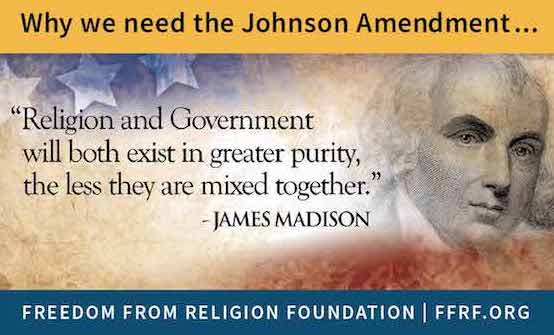
The Freedom From Religion Foundation is celebrating a huge victory for the separation between state and church. The new tax bill leaves intact the wise ban on church electioneering: The Johnson Amendment.
The Johnson Amendment keeps nonprofits nonpartisan. Under it, churches and tax-exempt 501(c)(3) nonprofits may not endorse or oppose political candidates. They may discuss and advocate on issues; they may not come out for or against specific candidates. The second-highest court in the United States decided nearly 20 years ago that the rule does not infringe free speech rights or religious freedom.
The House version of the Tax bill gutted the Johnson Amendment while the Senate version left it untouched. Reports now confirm that the final bill the conference committee has been negotiating will also leave the Johnson Amendment alone.
“This win is bigger than most people realize,” explains FFRF’s Director of Strategic Response Andrew L. Seidel. “It keeps billions of dollars in dark money out of churches and stops a desperate religious power grab.”
Seidel directs FFRF’s new strategic response team, which works to represent freethinkers with elected officials.
“FFRF has done more than our members know,” says FFRF Co-president Dan Barker. “We’ve had 30 meetings with legislators about this issue and did a lot of behind-the-scenes work to protect this important rule.”
Mobilizing its 30,000 members nationwide, FFRF sent out a number of alerts on the tax reform bill and many other alerts to protect the Johnson Amendment this year. Members inundated their legislators with one message: Protect the Johnson Amendment.
This win comes on the heel of two other big victories this week for state / church separation. In another legislative victory, the Foundation helped stop one of Donald Trump’s worst judicial nominees, Jeff Mateer, from getting a lifetime appointment on the federal bench. The state-church watchdog also voluntarily dismissed a lawsuit against President Trump over his executive order — which can be refiled at any time — after forcing the Department of Justice to admit to a federal court that the order does not affect the Johnson Amendment. FFRF also sued the IRS in 2012 for not enforcing the Johnson Amendment, indeed not even having an official in place to determine if churches were violating the important safeguard. The lawsuit changed that.
An influx of dark money flowing through churches into politics would have led to heavy government regulation of houses of worship, something Seidel explained last month in an op-ed for Religion News Service. The churches actually dodged a bullet, clarifies Seidel, noting that where money goes, regulation follows.
FFRF Co-President Annie Laurie Gaylor observed that, combined with the outcome of Roy Moore’s theocratic candidacy for a seat on the Senate, it’s been “an excellent week overall” for the Establishment Clause.
The danger to the Johnson Amendment is not over, but FFRF will be ready. FFRF is the watcher on the wall and we aren’t going anywhere.

